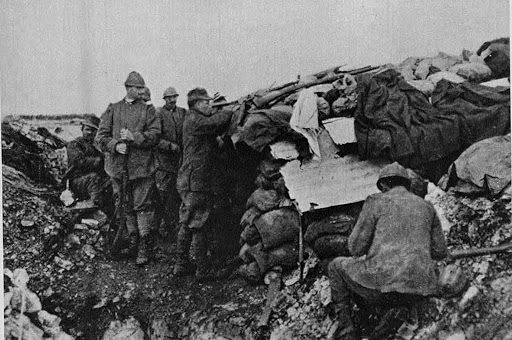A hundred years ago, Western civilization attempted suicide. It nearly succeeded, and still has not fully recovered.
When Austro-Hungarian guns opened up on Serbian forces on July 28, 1914, they inflicted far more casualties than the commanders on either side could have imagined: The fall of that first domino inexorably led to the deaths of ten million men in combat, uncounted civilians who would die under German shells or starve from British blockades, and the tens of millions more who would die after war’s end from the influenza epidemic spread by returning soldiers. Many millions more would die in the Armenian genocide and the Russian Civil War, two direct results of World War I.
The Ukrainian famine, the Soviet Terror, the Second World War, and the Holocaust, all sprouted from seeds that were planted a hundred years ago today. Historian of “democide” R.J. Rummel estimated in Death by Government that some 133.1 million civilians were intentionally killed by civilian governments in the course of the twentieth century—a staggering death toll that would have been simply unthinkable to citizens of the peaceful, prosperous world that we can glimpse from reading the stories of Sherlock Holmes. Most of those deaths were the direct or indirect result of the First World War.
It is hard for us to imagine quite how different the world looked in 1914, how shocking were the catastrophic changes that World War I imposed. Before the war:
- Europe and the Middle East were widely scattered with ethnic and religious minorities, who had lived side by side in comparative peace for hundreds of years. The fanatical ethnic hatreds sparked by the war would lead to widespread, cruel “ethnic cleansing,” that would continue in more or less bloody ways for decades—as national majorities purged themselves of minorities, a process that did not end until a grim uniformity prevailed, and the Jews of Russia and Poland were mostly dead.
- Nationalism was only one source of political loyalty—in competition with other, more tolerant organizing principles, such as loyalty to a dynasty or government. Croats were faithful to a German-speaking emperor in Vienna, and hundreds of thousands of Jews faithfully served the German Kaiser.
- The Muslim world was infinitely more complex and less prone to extremism than it has become in subsequent decades. As Philip Jenkins documents, the collapse of the Turkish caliphate goaded Muslims around the world to seek a new uniting principle, which many found in puritanical, intolerant versions of Islam such as would give birth to Al-Qaeda.
- It was universally taken for granted that governments played a small role in the lives of everyday citizens, and in managing the economy. Free trade, a stable currency linked to gold, and low taxes prevailed across most of the West, where the press was largely free and people could travel from London to Vladivostok without the need for a passport.
- Citizens could safely save money for the future, confident that their nest eggs would retain their original value and their investments would be protected by states that respected private property.
We could go on for many pages describing the valuable things that were smashed in the First World War, like a great cathedral shattered by a bomb. Historians will spend centuries unpacking the evil passions that were unleashed upon the world when the systems of order that had governed the West for hundreds of years fell suddenly into pieces.
The reckless gambles of statesmen in 1914 who were hungry for prestige, or eager to unite their diverse countries through hatred for common enemies, turned Europe’s order into anarchy. And in that chaos, bandits and cranks would come to power—once-marginal figures like Vladimir Lenin, Benito Mussolini, and Adolf Hitler. Outrageous, implausible doctrines such as Bolshevism and German “folkish” race worship became the official religions of enormous and powerful nations, and launched their own inquisitions. The echoes of their evil are still with us today, torturing the people of North Korea and Cuba, and forcing women to abort their children in China. The swaggering, wounded bully that is Vladimir Putin’s Russia is still deformed and poisoned by 70 years of tyranny, from which (birthrates don’t lie) it may never recover.
The order of today’s world is nearly as fragile as that which prevailed in 1914. We should be extremely careful. When statesmen promise that a war will be short and “limited,” we should remember that most of the troops who marched in August 1914 were certain that they would be back home for Christmas. On a deeper level, we need to revive the rich and generous moral code that arose in Christian Europe over many centuries, which recognized the sanctity of individual life and the non-negotiable rights of the human person to political, religious, and economic freedom.
These were the truths that Western man forgot, en masse, a hundred years ago today. Unless we wish to fall back into history’s bloody trench, we must make ourselves learn its lessons.
Jason Jones andJohn Zmirak are co-authors of the forthcomingThe Race to Save Our Century: How Modern Man Embraced Subhumanism and the Great Campaign to Build a Culture of Life.

